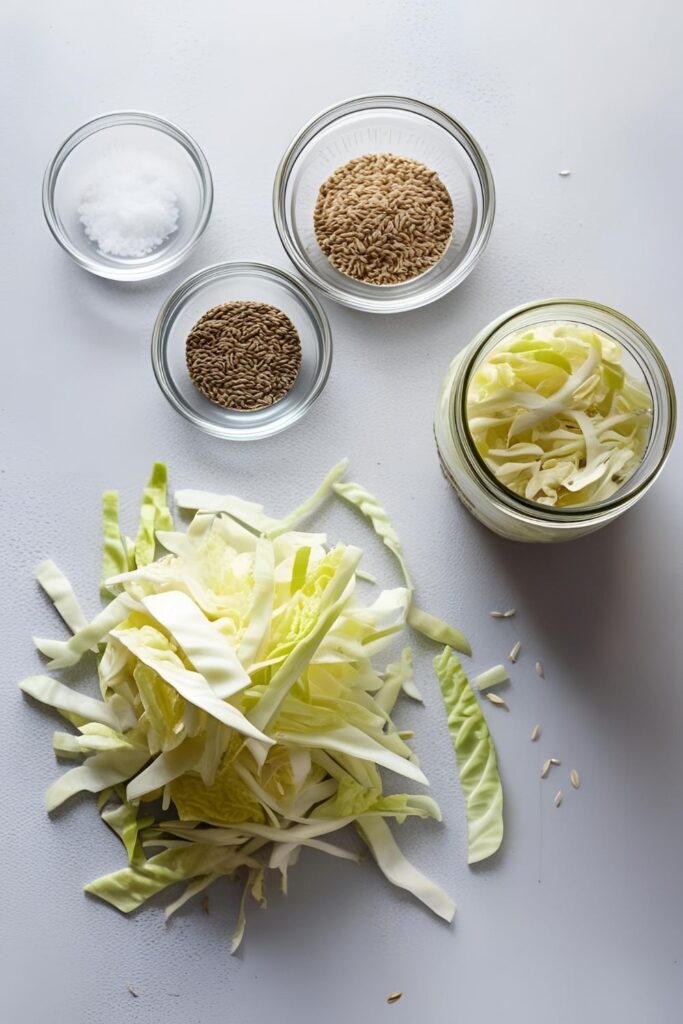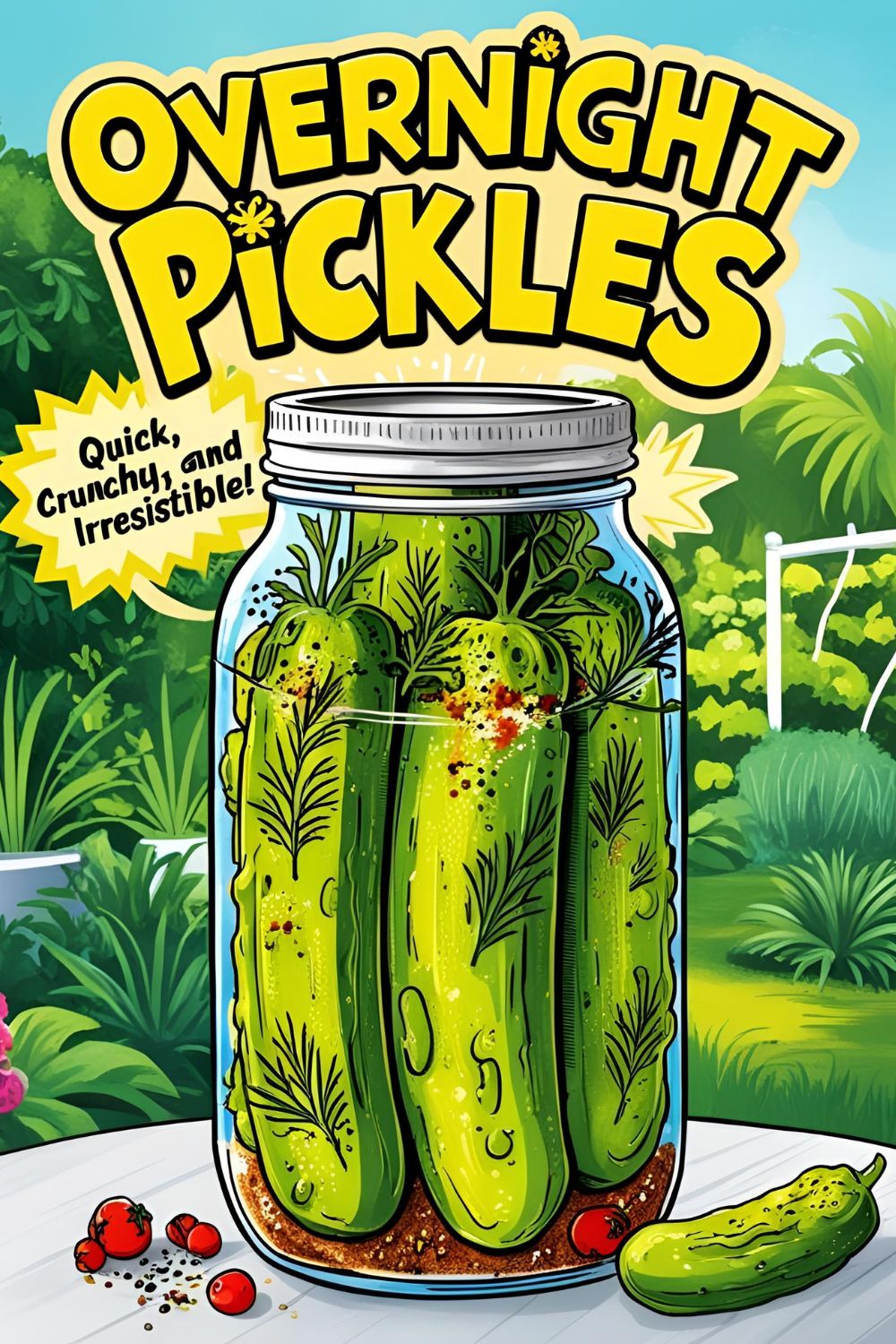24-Hour Sauerkraut: The Lazy Genius’s Guide to Fermented Glory
A Quick, Catchy Intro with a Viral Hook
Ever had that moment when you’re craving something tangy, crunchy, and just a tad funky, but the idea of waiting weeks for traditional sauerkraut feels like watching paint dry? Yeah, me too. Enter the 24-hour sauerkraut—because who has time for a month-long science experiment in their pantry?
Why This Recipe Is Awesome
Why should you care about this 24-hour sauerkraut? Well, for starters:
- Speedy Fermentation: Traditional sauerkraut takes weeks. This version? Just one day.
- Flavorful: Despite the quick turnaround, it doesn’t skimp on that classic tangy taste.
- Versatile: Perfect as a side, on sandwiches, or straight from the jar (no judgment).
- Gut-Friendly: Packed with probiotics to keep your digestive system happy.
Ingredients
- 1 medium head of green cabbage (about 2 lbs), shredded
- 1 tablespoon sea salt
- 1 teaspoon caraway seeds (optional, for that classic flavor)
- 1/2 cup filtered water
Substitutions:
- No caraway seeds? Try fennel seeds or skip them entirely.
- Want a spicy kick? Add a pinch of red pepper flakes.
Tools & Kitchen Gadgets Used
To make this 24-hour sauerkraut, you’ll need:
- Large mixing bowl: For massaging the cabbage.
- Sharp knife or mandoline: To shred the cabbage finely.
- Mason jar with lid: For fermenting the sauerkraut.
- Wooden spoon or tamper: To press the cabbage into the jar.
- Kitchen scale: Optional, but helpful for measuring salt accurately.
Note: These tools are available on Amazon. Feel free to check them out!
Step-by-Step Instructions
- Shred the Cabbage: Remove the outer leaves and core. Slice the cabbage thinly using a sharp knife or mandoline.
- Massage with Salt: Place the shredded cabbage in a large bowl. Sprinkle with sea salt. Massage vigorously for about 5-10 minutes until the cabbage releases its juices.
- Add Caraway Seeds: If using, sprinkle in the caraway seeds and mix well.
- Pack into Jar: Transfer the cabbage and its liquid into a mason jar. Press down firmly with a wooden spoon or tamper to eliminate air pockets and ensure the cabbage is submerged in its brine.
- Add Water if Needed: If the cabbage isn’t fully submerged, add filtered water to cover.
- Seal and Store: Close the jar with its lid. Leave it at room temperature (around 70°F or 21°C) for 24 hours.
- Check and Taste: After 24 hours, open the jar. If it smells pleasantly sour and tastes tangy, it’s ready. If not, let it ferment for another 12-24 hours.
- Refrigerate: Once it reaches your desired tanginess, store it in the fridge. It will continue to ferment slowly and develop more flavor over time.
Calories & Nutritional Info

Per 1/4 cup serving:
- Calories: 14
- Carbohydrates: 3g
- Protein: 1g
- Fat: 0g
- Sodium: 290mg
- Vitamin C: 21mg (23% DV)
Note: Nutritional values are approximate.
Common Mistakes to Avoid
- Using Tap Water: Chlorinated water can hinder fermentation. Use filtered water.
- Not Massaging Enough: Skimping on the massage means less brine, which can lead to dry sauerkraut.
- Overfilling the Jar: Leave some space at the top to prevent overflow during fermentation.
- Not Checking for Submersion: Cabbage must stay submerged to prevent mold.
- Opening the Jar Too Often: While it’s okay to check, frequent opening can introduce unwanted bacteria.
Variations & Customizations
- Spicy Sauerkraut: Add sliced jalapeños or red pepper flakes for heat.
- Garlic & Dill: Incorporate minced garlic and fresh dill for a pickle-inspired twist.
- Apple & Carrot: Mix in shredded apple and carrot for a sweeter, crunchy version.
FAQ Section
Q1: Can I use red cabbage instead of green?
Absolutely! Red cabbage will give you a vibrant purple sauerkraut with a slightly different flavor.
Q2: How long does this sauerkraut last?
Stored in the fridge, it can last up to 2 months. Always use a clean utensil to avoid contamination.
Q3: Is it normal for the sauerkraut to bubble?
Yes, bubbling indicates active fermentation. It’s a good sign!
Q4: My sauerkraut smells off. What did I do wrong?
An unpleasant odor may indicate contamination. Ensure all tools are clean and the cabbage stays submerged.
Q5: Can I add other vegetables?
Definitely! Carrots, radishes, and beets are popular additions.
Q6: Do I need to sterilize the jar?
Not necessarily. Washing with hot, soapy water is sufficient. Just ensure it’s clean.
Q7: Is this sauerkraut probiotic-rich?
Yes, as long as it’s fermented naturally and not pasteurized.
Final Thoughts
There you have it—a quick, easy, and delicious 24-hour sauerkraut recipe. Once you taste the homemade version, those store-bought jars will seem like a distant memory. Give it a try, and let your taste buds dance with joy!










